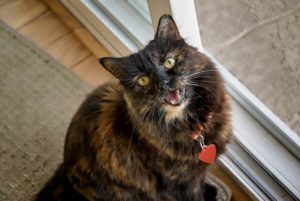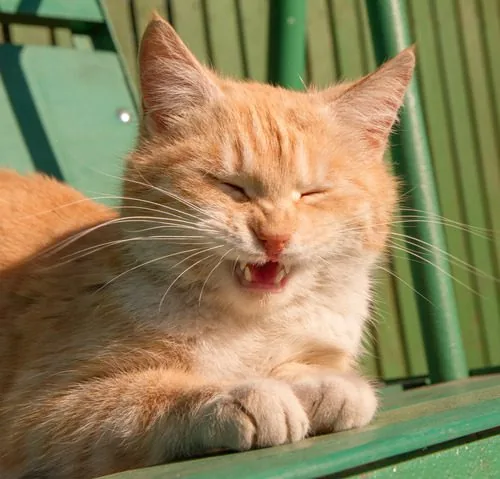Do you have a cat who meows often? Are you looking for information about why she might be doing this? Frequent meowing can be concerning to cat owners, but in many situations, there’s nothing to worry about. However, it’s important to learn what you can about this behavior so you can understand the underlying causes.
In this article, we’ll walk you through some of the most common causes of meowing in cats. Check out this list to see if you can determine what’s going on with your pet and to learn more about what to ask your veterinarian at their next visit, too. If you have any questions, call Boughton Square Animal Clinic in Bolingbrook, IL at (630) 759-0093.

Pain
Pain is one of the most common concerning causes of meowing in cats. Cats who are in pain will cry out and meow in an effort to get help for their injury or illness. Pain can cause cats to cry in a long, slow way that is much different from a normal, happy meow.
If you know your cat’s meowing is caused by pain or if you think this may be the case, you should take them to the vet as soon as possible. The vet will find the underlying cause of the pain and help you figure out how to treat or manage your cat’s condition moving forward.
Illness
Although it’s not very common, some cats may meow more often when they’re sick than at other times. Some illnesses may make your cat feel afraid or may cause pain that will lead to more frequent meowing. This type of meowing will sound strained and mournful in tone.
If you think there is any chance your cat’s meowing is due to an illness, it’s time to schedule a vet visit. The vet will give you more information as well as treatment or management options after performing several tests to figure out what’s wrong with your cat.
Fear
If your cat is afraid, they may yowl or howl in fear. This behavior is usually a sign that your cat is so frightened they feel the need to appear bigger and stronger than they really are. The yowling is intended to scare away the cause of the fear.
Sometimes, a cat who is frightened and yowling will quickly turn in to an aggressive cat. If your cat’s body language shows they’re afraid and their meowing tells you they’re very upset, it may be time to back away and let them calm down for a few minutes.
Hunger
If your cat is hungry, they may be more likely to start crying for food. This is more common in cats who are extremely hungry, but even well-fed cats who are used to eating on a schedule will learn to start meowing for their dinner when the time comes.
You can reduce this meowing by feeding your cat on a regular schedule. However, some cats will get excited when it’s time to eat and will start meowing while you’re preparing their food or walking to the food bowl. This is perfectly normal and is nothing to worry about.
In Heat
If your cat is an intact female—meaning she has not been spayed—and she is old enough to have kittens, she will go into heat sometimes. When cats do this, they yowl and cry because they want to find a male cat to mate with.
Intact male cats may also meow more often when they can smell a female in heat nearby. In some instances, cats have even been known to notice a neighbor’s cat in heat, so you might be surprised at how easy it is for your male cat to be aware of interested females in the area.
Saying Hi and Wanting Attention
Finally, there are many cats who simply like to talk! They may enjoy meeting you at the door to say hello, or they might meow when they want you to pet or cuddle with them. If your cat is a talkative one by nature, there’s nothing to worry about.
If you do want to teach your cat to be quieter when they want something, try ignoring them while they meow and only respond with attention when they are quiet.
As you can see, there are a lot of reasons why you cat might be meowing excessively, and some of them are much less serious than others. Since some problems causing excessive meowing can be dangerous, it’s important to take your cat to the vet if you can’t figure out the cause for yourself.
Otherwise, if you’re positive you know what’s going on with your cat after reading this article and you know they’re not sick or in pain, there’s no reason to go to the vet right away. You can wait for the next regular visit you have scheduled to ask more. Call us today at (630) 759-0093.
Recent Posts
6 Possible Causes for Your Cat’s Sneezing
6 Possible Causes for Your Cat’s Sneezing Cats are known for their curious and playful nature, but…
Why is My Dog Eating Grass?
Why is My Dog Eating Grass? Dogs are known for their curious behaviors, and one that often…
Can Dogs Eat Marshmallows?
Can Dogs Eat Marshmallows? Marshmallows are a popular treat for many people, but pet owners often wonder,…
Can Dogs Get Sunburn?
Can Dogs Get Sunburn? As summer approaches and the days get longer, many pet owners look forward…
Dog Dehydration: Symptoms, Treatment and Prevention
Dog Dehydration: Symptoms, Treatment and Prevention Dehydration in dogs is a common but often overlooked condition that…
About Boughton Square Animal Clinic
Since 1979, Boughton Square Animal Clinic has served Bolingbrook, IL and surrounding communities as both a veterinary care provider and a devoted partner in treating your animal family members for life.






